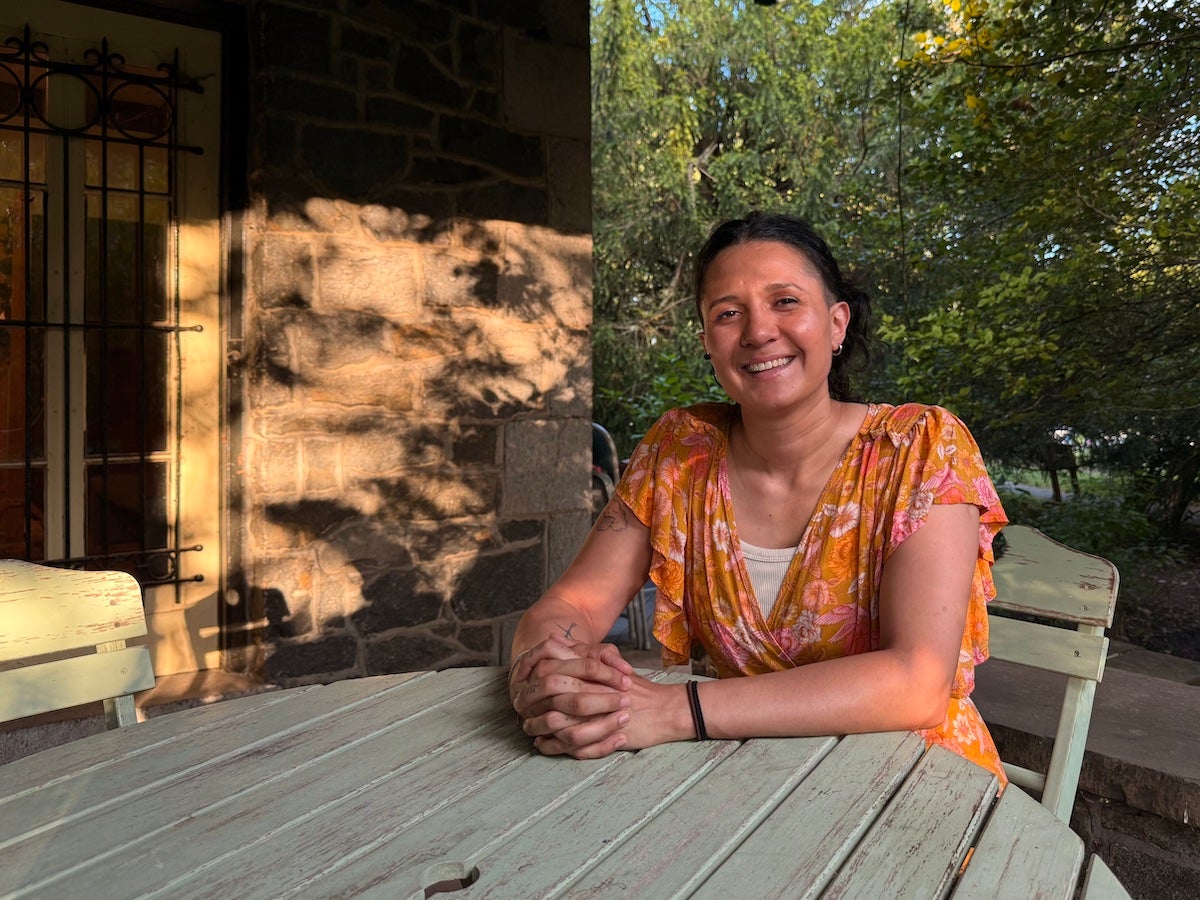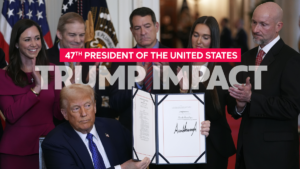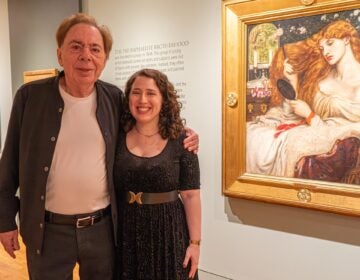Shakespeare goes bilingual to spotlight the realities of immigration, family separation, identity and belonging in Delaware
A retelling of Shakespeare’s “Twelfth Night” outdoors at Rockwood Park shows the reality of migration and family separation.
Listen 3:33
During a protest scene, one cast member holds a sign reading “Liberation, not deportation,” echoing real-life demonstrations and reflecting the ongoing fight for immigrant rights in the United States. (Johnny Perez-Gonzalez/WHYY)
What are journalists missing from the state of Delaware? What would you most like WHYY News to cover? Let us know.
As the sun dipped behind the trees at Rockwood Park, the stage lights began to glow. On opening night, more than 100 people laid down their blankets and propped up their lawn chairs at the Wilmington park, snacks in hand, ready for an evening under the stars. But what they were about to witness wasn’t just another summer Shakespeare show. It was a story about family, identity and survival — a bilingual musical adaptation that places migration at its center.
A classic rewritten for difficult times
“Twelfth Night, O Lo Que Quieras,” presented by Delaware Shakespeare, is a bold retelling of the classic comedy penned by William Shakespeare in the early 1600s. Originally about twins Viola and Sebastian, this version reimagines the pair as Violetta and Sebastían, two migrants from Venezuela who lose each other during a storm and find themselves navigating life undocumented in a fictional country, Illyria. Like the original, Violetta disguises herself for safety — but while concealing her gender in a foreign land, she must also now conceal her identity as an immigrant.
That reimagined twist came from composer Liz Filios and writer Tanaquil Marquez, who first conceptualized the show during the first Trump administration.
“In Shakespeare’s version, Viola, presumably in the 1500s, it’s dangerous to be a fem out there in the world alone. So, she disguises herself as a boy and starts working for the Duke to find a way back into society and safety,” said Izzy Sazak, who plays Violetta. “And Liz and Tana had this brilliant idea to adapt the story to be about migration. So now Violetta and Sebastian are two migrants who are seeking a new life … They’re leaving everything they have known behind to come to a new country to start a new life and they are separated and lose their documentation and find themselves in a foreign and hostile country without papers.”

Initially performed as an outdoor concert and later as a touring community show in 2022, the current version is more urgent and expansive. The creators intentionally leaned into the bilingualism and complexity of the immigrant experience — especially for families who face separation and fear of deportation.
Andrew Watring, director of the production and associate producer at Peoples Light, said the current political realities shaped the show deeply.
“As we were working on this, we were saying that reality was far outpacing the story that we were doing,” he said. “People are disappearing off the streets, people are being taken from supermarkets while they’re shopping, people are being taken from their immigration hearings without cause and without due process. This was all happening while we were sort of constructing the story — about someone who comes to a country illegally, has to hide their identity, who is under threat of deportation, other characters who are taken off the street.”
“It got to the point where reality was so much more terrifying and horrible than anything that we could put on stage,” he added. “What we are happy that we are able to do in this musical is to showcase that urgency and to showcase the seriousness of the issue.”
The power of visibility
This level of realism is reflected in the characters’ journeys, the storytelling and even the music. In the opening scene, Violetta washes ashore and encounters a sailor who speaks a different language.
“One speaks English, one speaks Spanish. And they’re learning through the song and through the dialogue to actually communicate with each other,” Watring said.
As the sun sets at Wilmingtons Rockwood Park, Twelfth Night, O Lo Que Quieras goes live under the stars — a bilingual retelling where Viola, now Violetta, arrives in Illyria as an immigrant, mirroring the struggles, hopes, and realities so many face today. pic.twitter.com/W1mAp7mPXI
— Johnny Perez (@johnnyperez__) July 23, 2025
The emotional weight of the story also runs through the cast itself. Many of the cast members are first-generation or children of immigrants. Sazak, who is Turkish and Colombian, said their own background added layers of meaning to the role.
“My mom is Colombian, first generation. She immigrated to the states with her family in the 1960s when she was 3. She grew up in California and then she met my dad, who’s Turkish. They fell in love and they moved to Turkey and that’s where I was born and raised and I left Turkey and came back here,” Sazak said. “My family history is a story of migration … I am very fortunate that I have U.S. citizenship, but who knows what that means anymore. But I am a descendant from migrants. We are all descendants from migrants. Migration is all of human history. So, even if it doesn’t affect you directly, it does affect you indirectly.”
Sazak said that same story is shared by many other members in the cast.
“Some of them are themselves first generation from Ecuador, from Dominican Republic, from Mexico, and we are all feeling this current moment and know people who are being taken away, who are being kidnapped, and we’re all feeling the danger and the urgency of this story,” they said.
Despite its weight, “Twelfth Night, O Lo Que Quieras” is filled with joy, music and hope. For Sazak, the journey has been deeply personal.
“This show has been so important and impactful in my life, it moves me to tears very often. I am incredibly honored and incredibly grateful to be able to carry this story and I do not carry it lightly. I carry it with great respect and love and compassion,” they said. “You might be moved to tears. Some of the music is really very moving, but you’ll also be moved to laughter and it’s also very queer, very gay.”

That queerness is more than symbolic. Sazak explained the character of Violetta resonates with their own identity.
“I’m nonbinary. I use they/them pronouns. I’m queer, I’m pansexual,” Sazak said. “Violetta or Viola in both plays in both versions has flirtations with people of many genders and many identities. That’s also part of the appeal. It’s extremely expansive. It’s really loving. It’s here for all of us and it really is trying to spread the message and it literally says, ‘No one is free until everyone is free. No one is safe until everyone is safe. No one belongs until we all belong.’”
The production team’s hope is that the show serves as both a mirror for the immigrant community and builds the bridge for all communities to better understand what immigrants experience.
“We all believe that we can reach people through the power of storytelling and the power of art and music. So, we’re here trying to tell a hopeful story,” said Sazak. “For immigrant families, it’s for them to feel seen, to feel honored, to hear themselves and see themselves represented on stage and to literally hear one of their languages represented on stage and to hear their music.”
“For everyone else, it’s to hopefully create a bridge of empathy and to recognize themselves in it as well. First and foremost, this country belongs to Indigenous people and everyone else who is on this land is a migrant and a descendant of a migrant,” they said. “So that has been conveniently forgotten or pushed under the rug for many many reasons. But if we could all remember that I think we could walk away a lot better and a lot closer with more questions, more hope and hopefully more connection to our community.”
“Twelfth Night, O Lo Que Quieras” is running as part of Delaware Shakespeare’s Summer Festival until Aug. 3. It plays outdoors at Wilmington’s Rockwood Park.

Get daily updates from WHYY News!
WHYY is your source for fact-based, in-depth journalism and information. As a nonprofit organization, we rely on financial support from readers like you. Please give today.







